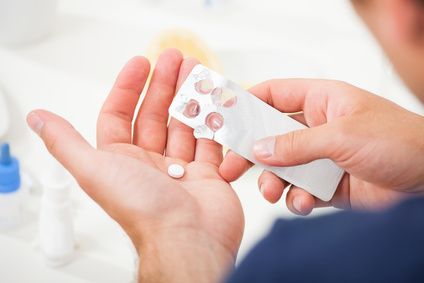
(Vienna, 11 April 2017) Patients with inflammatory diseases are often prescribed non-steroidal anti-inflammatory drugs. They are also often recommended to use a proton pump inhibitor to protect their stomach. In a joint study, clinical pharmacologist Markus Zeitlinger and gastroenterologist Werner Dolak from MedUni Vienna showed that this combination of medication can result in inflammation in the small intestine. However, if an antibiotic (rifaximin) is additionally given, the intestine remains protected. The study has now been published in the leading journal "Gastroenterology".
People who suffer from inflammatory joint conditions or pain often take non-steroidal anti-inflammatories, like the well-known drug diclofenac, for example. However, such drugs often attack the stomach lining, so that patients are also prescribed something to protect their stomach from the NSAID. But this combination damages the intestines. Anti-inflammatory drugs can cause inflammation throughout the entire gastrointestinal tract and proton pump inhibitors have a negative impact upon the bacterial gut flora so that the small intestine can be colonised by undesirable bacteria. This can adversely affect the highly individual microbiome of the person concerned.
Live images from the intestines
Markus Zeitlinger from the Department of Clinical Pharmacology and Werner Dolak from the Department of Medicine III studied sixty healthy volunteers over a period of fourteen days, monitoring the drug-related reaction in the intestinal tract by means of capsule endoscopy imaging. This process involves swallowing a capsule containing a camera, which then automatically takes pictures on its way through the gastrointestinal tract and transmits them to an external portable data recorder. The images can then be analysed on the computer and the camera is excreted in the normal way.
The volunteers were first of all examined by capsule endoscopy and then divided into two groups. One group was given diclofenac with omeprazol as gastric protection plus the antibiotic rifaximin, which the animal models had shown to have a beneficial and protective effect upon the intestines. The other group was given a placebo in place of rifaximin. After two weeks, another capsule endoscopy was performed and this showed significant inflammations in the small intestine in approximately one third of the latter group. The other group of volunteers, who had also been given rifaximin, displayed significantly fewer inflammatory changes and, where these did occur, they were less severe.
The results of the double-blind study served to confirm the proposition that the additional administration of rifaximin protects the intestines. As a next step, it is intended to conduct a study to investigate the treatment concept on regular users of non-steroidal anti-inflammatory drugs.
Service: Gastroenterology
"Rifaximin Reduces the Number and Severity of Intestinal Lesions Associated With Use of Nonsteroidal Anti-Inflammatory Drugs in Humans." Scarpignato C1, Dolak W2, Lanas A3, Matzneller P4, Renzulli C5, Grimaldi M5, Zeitlinger M4, Bjarnason I6.Gastroenterology. 2017 Apr;152(5):980-982. doi: 10.1053/j.gastro.2016.12.007.